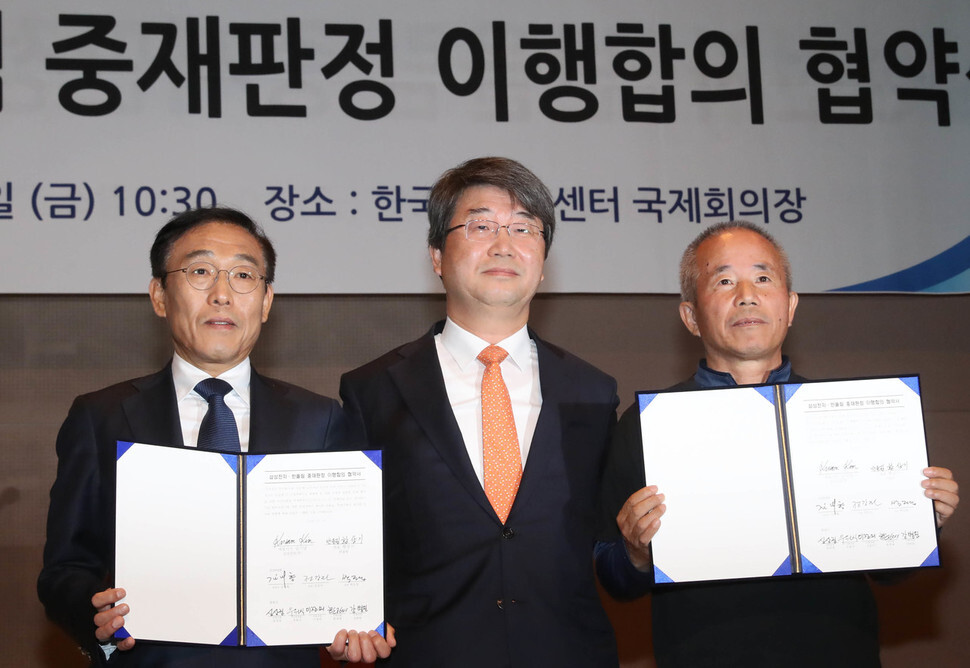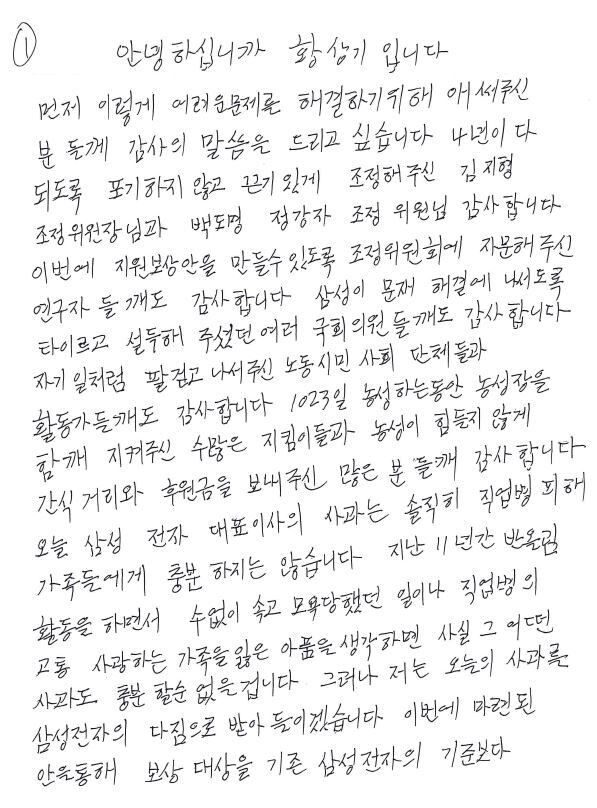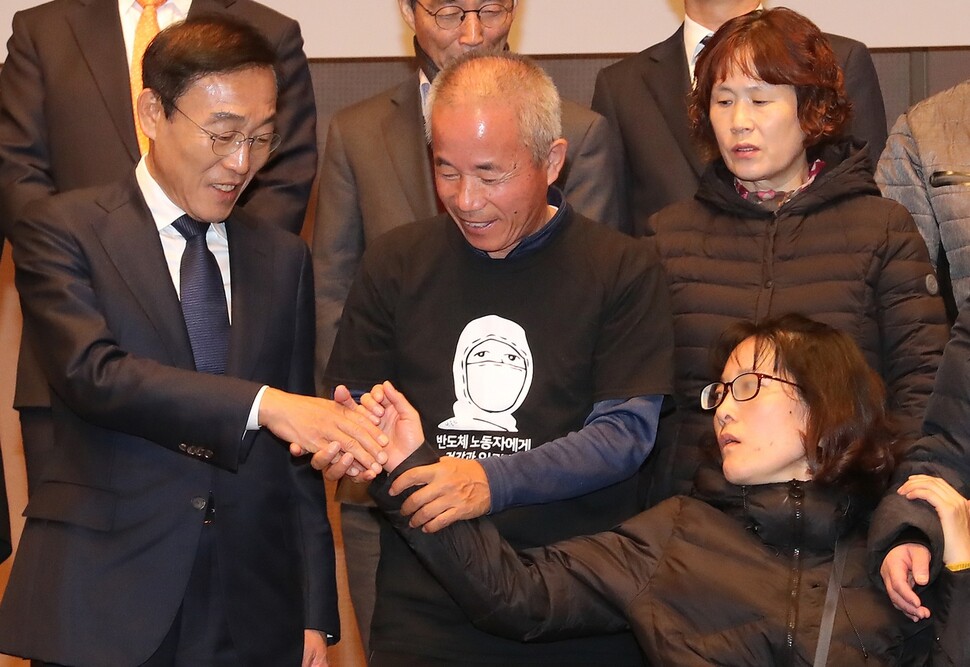hankyoreh
Links to other country sites 다른 나라 사이트 링크
Father of Samsung leukemia victim receives apology after 11-year struggle

Hwang Sang-gi, 63, couldn’t even cry after finally receiving a “sincere apology” after an 11-year campaign. Hwang had lost his daughter Yu-mi in Mar. 2007 when she was 22 years old, in the prime of her life. When he spoke before lawmakers from South Korea’s National Assembly and representatives from Samsung Electronics on Nov. 23, all he could say was, “I’m truly glad to have kept my promise to my daughter.”
At the same time, Hwang couldn’t laugh either. Hwang’s mother was driven to an early grave by the shock of seeing her granddaughter get sick and die, and his wife is still dealing with the depression brought on by her daughter’s death. Hwang had once navigated the streets of Sokcho as a taxi driver, but he had to put that job on hold when he hit the road in an effort to bring attention to his daughter’s unjust death. There was only a faint, almost imperceptible, smile on his lips.
As the president of Banollim, a watchdog group for semiconductor workers’ health and rights, Hwang held a ceremony with Samsung Electronics at the Press Center in Seoul’s Jung District to formalize the arbitration agreement. This marked the end of Hwang’s plaintive struggle, which had lasted for 11 years. The ceremony began with Samsung Electronics President Kim Ki-nam saying, “We offer a sincere apology to the employees who have suffered from disease and to their family members.” Kim then yielded the stage to Hwang, who said he would regard that apology as a promise.
“In all honesty, the apology that the president of Samsung Electronics made today was not enough for the families of the victims of occupational diseases. When I think about the anguish of losing loved ones, the pain of occupational diseases and how we were constantly insulted and deceived while working with Banollim over the past 11 years, no apology could be enough. But I will accept today’s apology by Samsung Electronics as a promise,” Hwang said.
Hwang had scribbled the speech himself in an unsteady hand, but he delivered it with conviction. At various points during the delivery, he expressed his appreciation to many different people – to Kim Ji-hyeong, chair of the arbitration committee; to the researchers who had offered their advice; to the lawmakers who had persuaded Samsung to take action to address the problem; to activists and groups from the labor community; and to the many protesters who had occupied the campaign’s tent during a 1,023-day demonstration.

How his daughter’s job a semiconductor family turned into a nightmare
After graduating from Sokcho Commercial High School, Hwang’s daughter Yu-mi got a job on the semiconductor production line at the Samsung Electronics factory in Giheung, Gyeonggi Province. In 2005, just two years after being hired, Yu-mi was diagnosed with acute leukemia. After Yu-mi received a bone marrow transplant, her manager at Samsung came by to accept Yu-mi’s resignation and tried to give the family 5 million won (US$4,409).
“Let’s settle things like this, since this is the only money Samsung has to offer,” the manager said. When Hwang asked for his daughter’s illness to be recognized as being job-related, the manager said that was absurd and claimed that no chemicals were used or handled in the semiconductor factory. That moment marked the beginning of Hwang’s agonizing struggle.
Hwang had promised his daughter he would get to the bottom of her disease, and he did everything in his power to keep that promise. He helped bring attention to the stories of other workers who had contracted leukemia while working at Samsung Electronics’ semiconductor factories. Banollim was launched in Mar. 2008, the year after his daughter died. Hwang’s story was turned into the 2014 film “Another Promise.”

During the ceremony on Nov. 23, which was made possible by the effort of activists and family members of the victims like Hwang, Samsung Electronics promised that it would post information about compensation and support on the company website along with the text of the apology and that it would also send the apology under the name of the president to the victims. The company also agreed to give the Korea Occupational Safety and Health Agency (KOSHA) 50 billion won (US$44.1 million) to set up a fund for developing industrial safety and health as part of its corporate social responsibility and in the interest of preventing such events from reoccurring. This money will be used in several industrial accidental prevention programs, such as building a center for health and safety in the electronics industry.
Also attending the event were Rep. Woo Won-sik, Rep. Han Jeong-ae and Rep. Kang Byeong-won, all lawmakers from the Democratic Party; Rep. Lee Jeong-mi, leader of the Justice Party, and Rep. Sim Sang-jung, another lawmaker from that party; and Ahn Gyeong-deok, head of the office of labor policy at the Ministry of Employment and Labor.
“This is designed to be a social agreement that goes beyond an agreement between the respective parties about compensation,” explained the law firm Jipyong, which organized the event.
“This agreement has also left politicians with an important task. I’ll do my best in the National Assembly to institute reforms aimed at strengthening worker safety,” said Sim Sang-jung. Sim was the one who had suggested that Samsung and Banollim submit to arbitration.
During a ceremony in July when the parties concerned signed an agreement about the arbitration committee’s methodology, Hwang had burst into tears while making some remarks. Having concluded that no agreement could be reached under the original approach, the arbitration committee had suggested that both sides agree in advance to unconditionally accept its arbitration plan. By agreeing to do so, Samsung Electronics and Banollim paved the way for resolving the situation.
“I’m glad I was able to keep the promise I made to my daughter Yu-mi. But I can’t forget the pain that Yu-mi and my family have suffered. Far too many people know this pain,” Hwang said. Joining his hands together, he had one last appeal for the people concerned, including the support and compensation committee, which was set up to implement the agreement, and KOSHA, which will be managing the 50 billion won (“which in fact was earned through workers’ sweat”). Please don’t forget their pain, Hwang said.
By Park Ki-yong, staff reporter
Please direct comments or questions to [english@hani.co.kr]

Editorial・opinion
![[Guest essay] Amending the Constitution is Yoon’s key to leaving office in public’s good graces [Guest essay] Amending the Constitution is Yoon’s key to leaving office in public’s good graces](https://flexible.img.hani.co.kr/flexible/normal/500/300/imgdb/original/2024/0416/8917132552387962.jpg) [Guest essay] Amending the Constitution is Yoon’s key to leaving office in public’s good graces
[Guest essay] Amending the Constitution is Yoon’s key to leaving office in public’s good graces![[Editorial] 10 years on, lessons of Sewol tragedy must never be forgotten [Editorial] 10 years on, lessons of Sewol tragedy must never be forgotten](https://flexible.img.hani.co.kr/flexible/normal/500/300/imgdb/original/2024/0416/8317132536568958.jpg) [Editorial] 10 years on, lessons of Sewol tragedy must never be forgotten
[Editorial] 10 years on, lessons of Sewol tragedy must never be forgotten- [Column] A death blow to Korea’s prosecutor politics
- [Correspondent’s column] The US and the end of Japanese pacifism
- [Guest essay] How Korea turned its trainee doctors into monsters
- [Guest essay] As someone who helped forge Seoul-Moscow ties, their status today troubles me
- [Editorial] Koreans sent a loud and clear message to Yoon
- [Column] In Korea’s midterm elections, it’s time for accountability
- [Guest essay] At only 26, I’ve seen 4 wars in my home of Gaza
- [Column] Syngman Rhee’s bloody legacy in Jeju
Most viewed articles
- 1[Guest essay] Amending the Constitution is Yoon’s key to leaving office in public’s good graces
- 2[Editorial] 10 years on, lessons of Sewol tragedy must never be forgotten
- 3Faith in the power of memory: Why these teens carry yellow ribbons for Sewol
- 4Final search of Sewol hull complete, with 5 victims still missing
- 5[Guest essay] How Korea turned its trainee doctors into monsters
- 6How Samsung’s promises of cutting-edge tech won US semiconductor grants on par with TSMC
- 7Korea ranks among 10 countries going backward on coal power, report shows
- 8Pres. Park an accomplice in ordering resignation of CJ Group vice chairman
- 9[News analysis] Watershed augmentation of US-Japan alliance to put Korea’s diplomacy to the test
- 10K-pop a major contributor to boom in physical album sales worldwide, says IFPI analyst